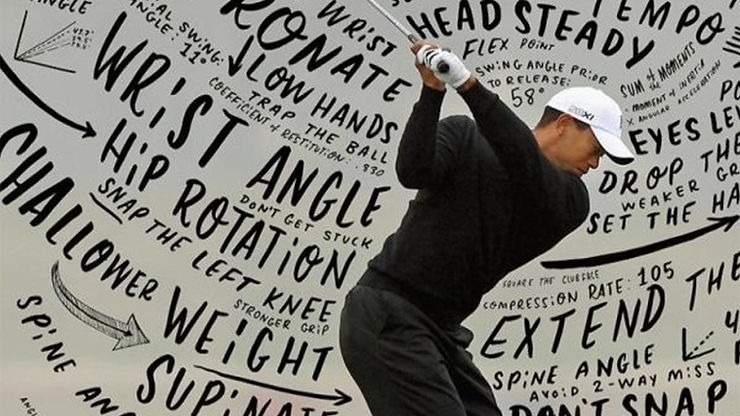How many golf accounts do you follow on social media? How many of those accounts are instructors? How many of those instructors post golf tips?
Do you believe that these tips help you play better golf?

There is no shortage of golf instruction available on the internet. There countless websites, magazines, and social media accounts that post golf tips. Some of them post nonsense, but generally the quality of information available is getting better and better every year.
Despite all of this information, It is still very common to find new students who are terribly confused about their games. Often these students are incredibly passionate about the game, and so search out information wherever they can find it. I’ve started to call this “Scatterbrained Syndrome”.
I believe that being able to focus intensely for a prolonged period is essential for adults to improve at any skill. Children can often improve a lot with a half hearted effort, until they hit their plateau, but adults generally don’t. Adults need to be able to bring forth their full attention and focus to be able to improve. So when I see signs of a scattered brain in a new student, or see it developing in a current student it becomes a priority of mine to address. Simply, I don’t think it is very likely that students will make any real improvements in that state of mind.
They key problem with the vast amount of information that is available online is,
How do you know which information applies to you, and which does not?
There is a concept in science and engineering of Signal to Noise Ratio, which is a measure that compares the level of a desired signal to the level of background noise. The concept is now being used informally to refer to the ratio of useful information (signal) to useless or irrelevant information (noise). I think this concept is very useful. To reduce confusion, you need to improve your Signal to Noise ratio. To do that you should amplify the signal, and reduce the noise. There are a few very simple ways to do both.
Amplify Signal
- Hire a golf coach to diagnose an issue and make a plan for improvement. You should know exactly what you are supposed to do every time you practice. “Coaching” rather than a few lessons is useful here as everyone goes through periods of Scatterbrain Syndrome, usually during a period of poor performance (which is normal). I go through these periods too. A good coach who you see often will “keep your hand away from the panic button” as my coach Ryan Chaney says to me.
- Physically write out your practice plan and keep it in your golf bag. Each practice, give it a read before you start. I use CoachNow for this with my students. After a session I upload a re-cap video that clearly explains what I want them to be practicing and the standards I think they should aim to achieve in each practice session. I keep these videos short enough so that students can easily pull their phones out and watch it before they practice.
Reduce Noise
- Stop consuming golf “edutainment”. Be it on social media, golf magazines, or online. You likely do not have the expertise to filter out what is useful from what isn’t. That expertise is rare, and is built through hard earned study and experience. I gained a lot of this expertise through ruining, and then rebuilding my own golf game. That process was not fun, and took a long time. I’d highly encourage you to avoid doing that to yourself….
- When you watch golf on television, mute the broadcast. The commentators have an obligation to fill the empty space with sound. As a result, they spread so much nonsensical information that definitely makes golfers worse. A lot of this information has become cliche even when it is objectively false. Putts are not magically pulled away from mountains or towards creeks….. If you want to hear the sounds of golf shots, birds, and the clink of the ball going in the hole and must listen to the broadcast, at least ignore the commentators.
These are 4 very simple tips that will improve the clarity of any golfer’s mind, and such I have no qualms about sharing this article. If you make a small effort to improve the Signal to Noise ratio in your golf life, I believe wholeheartedly that you will have a better chance of improving, and enjoying your golf game.
